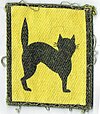17th Infantry Division (India)
| 17th Indian Infantry Division | |
|---|---|

Shoulder patch of the 17th Indian Infantry Division.
|
|
| Active | 1941–1946 1960– |
| Country |
|
| Allegiance |
|
| Branch |
|
| Type | Infantry |
| Size | Division |
| Nickname(s) | "The Black Cat Division" |
| Engagements |
Battle of Imphal Battle of Meiktila |
| Battle honours | Burma |
| Commanders | |
| Notable commanders |
Jackie Smyth David Tennant Cowan W. A. Crowther |
The 17th Infantry Division is a formation of the Indian Army. During World War II, it had the distinction of being continually in combat during the three-year-long Burma Campaign (except for brief periods of refit).
It was first formed in 1941, in Ahmednagar in India. It consisted then of the 44th, 45th and 46th Indian Infantry Brigades, and was intended to garrison Iraq. At the end of the year, war with Imperial Japan broke out and the division was split; 44th and 45th Brigades were despatched to Malaya where 45th Brigade fought in the Battle of Muar before both brigades were lost in the Battle of Singapore; 46th Brigade and the division HQ went to Burma, where the Division was reinforced by 16th Indian Infantry Brigade and took 2nd Burma Infantry Brigade under command.
The Japanese attacked Burma on January 22, 1942. It was soon apparent that the British and Indian troops in Burma were too few in number, wrongly equipped and inadequately trained for the terrain and conditions. After failing to hold the Kawkareik Pass and Moulmein, the division fell back to the Bilin River, where it was joined by 48th Indian Infantry Brigade.
The Bilin was not a proper defensive position, and the division tried to retreat over the Sittang River. Air attacks, poor organization and vehicle breakdowns delayed the division, and Japanese parties infiltrated around them to threaten the vital bridge over the Sittang. The division's commander, Major General "Jackie" Smyth VC, was forced to order the bridge to be destroyed, with most of the division cut off on the far side of the river. Only a few thousand men without equipment succeeded in crossing the river. Smyth was dismissed and replaced by Major General Cowan.
...
Wikipedia
